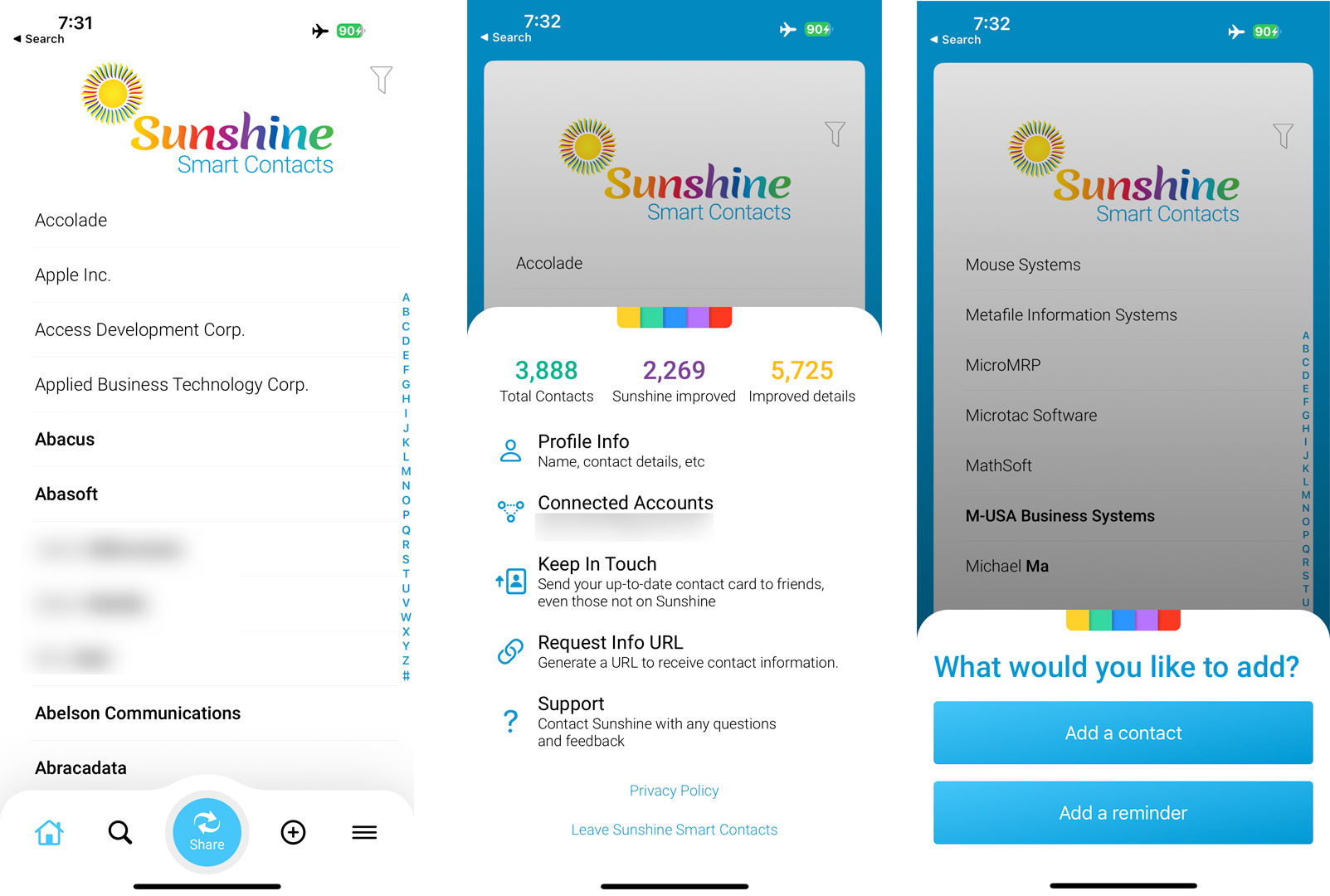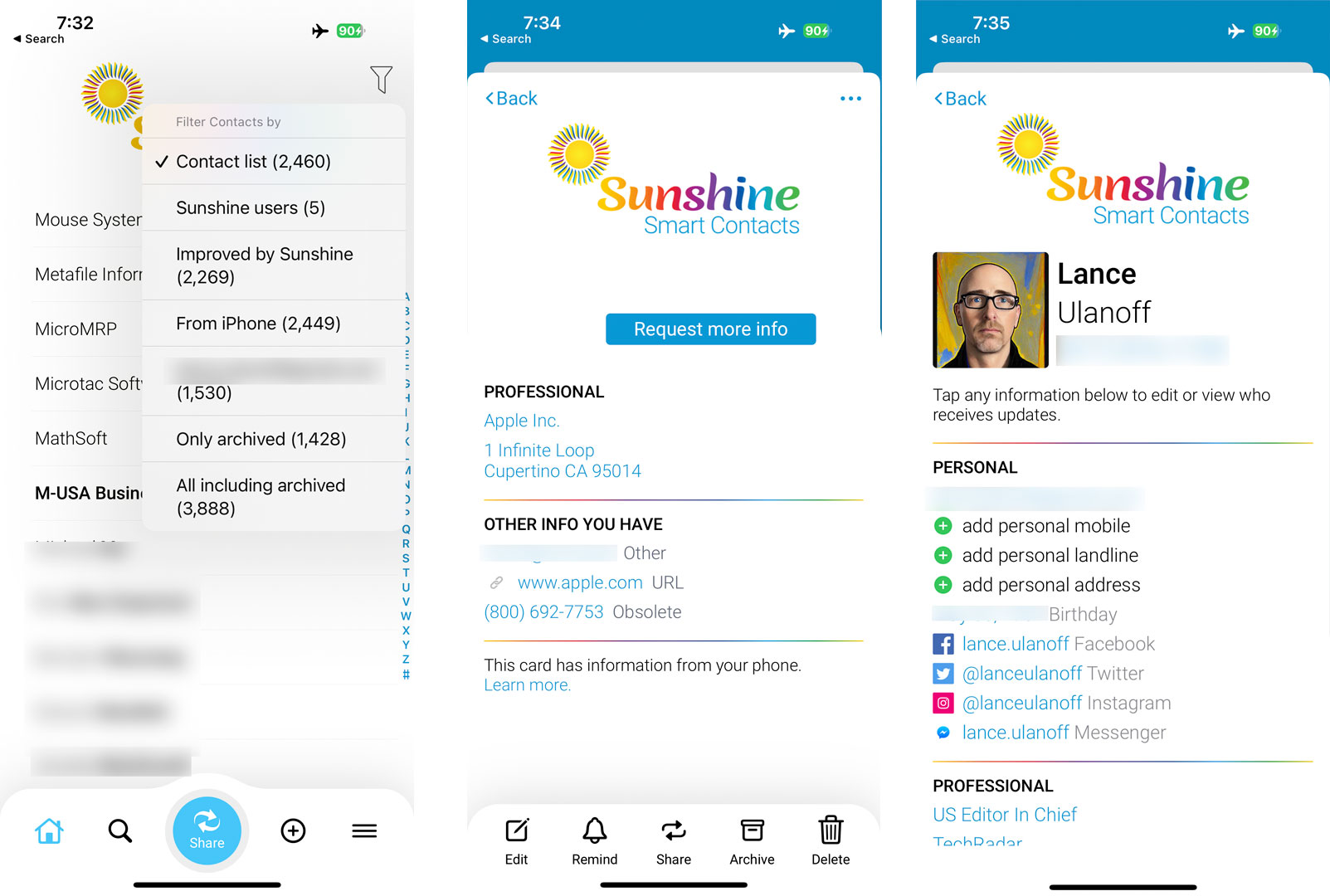
I trekked north in Manhattan to the Central Park-adjacent Ritz Carlton not just to meet the creator of a new personal contact app, but to sit opposite Marissa Mayer, who arguably helped define how we search, email, and consume news online.
Mayer is both an industry legend and a enigma, a once hugely popular and influential tech exec who not so much fell from grace as disappeared from view after she left Yahoo in 2017.
Aside from the somewhat posh location – a favorite of Mayer’s and where, years ago, she often saw Jessica Simpson’s tiny dog roaming the halls – there was little to indicate that this was a woman who, as one of the first dozen employees at Google, guided Google Search almost from its inception until around 2012, and hired Sundar Pichai, Google’s current CEO.
Both Google, and the difficult Yahoo stewardship that followed (and ended in 2017), were long in the rearview mirror as we talked one recent afternoon.
Mayer’s focus now is on Sunshine Contacts (formerly Sunshine Smart Contacts and formerly Lumi labs), a company developing a new app-driven way of approaching personal contacts, which she launched with co-founder Enrique Muñoz Torres, and where she currently serves as CEO.
The premise behind Mayer’s two-year-old project is simple: rescue contact management from neglect. Make collecting, keeping, and sharing contacts easy. Make updating them automatic, and do it all with a combination of pattern-matching, crowdsourcing, heuristics, and – inevitably and increasingly – AI.
We need to get contacts right. Right now, everyone’s contacts are a mess.
Marissa Mayer
Within just a hint of Steve Jobs hubris, Mayer described to me Sunshine Contacts' goals, “The company is focused on taking mundane everyday tasks that get in the way of you interacting with and relating to people, and making them magical and easier.”
On a more practical level, though, Mayer added “We need to get contacts right. Right now, everyone’s contacts are a mess.”
I wouldn’t argue the point. I’ve dragged my own contacts database, which has its foundation in a 30-year-old contact management app called Instant Recall (RIP), from platform to platform. Now it resides like a neglected stepchild mostly in Google contacts, but also partially in my iPhone.
Many people have old, rich contact databases, but no one is really taking care of them.
“Nobody manages their contacts,” Mayer told me, “It’s just too much of a pain. When you meet somebody new, you don’t stop and type in the 50-to-70 characters, making sure you got everyone’s name spelled exactly right. Nobody is taking that time, and therefore it ends up being a partially done, partially organized mess.”
Your contacts are your life
If, by the way, you think contact management is just a problem for businesspeople, you’d be wrong. Mayer and I talked about how most people’s primary contact management system is their phone, and how its contact management system is incredibly basic.
“Apple, renowned with good reason for its design… when you meet someone new, they think the appropriate way to support you is this…" She shows me the iPhone’s simplistic 'create contact' screen. "Like, ‘good luck.’”
It’s not just that the systems most of us use to keep track of contact details for everyone from our spouses to our coworkers to distant relatives and former colleagues is basic, it’s that what we’ve collected, and still use to try and connect with people, is full of outdated and useless information.
“When we have new people onboard, we can tell from other users and first-party data what’s obsolete, and about 18-20% of people’s address books are obsolete. So, you’re walking around, and you think you can get a hold of someone, and you try to get a hold of them or use that piece of information to get a hold of them and you couldn’t.”

I’ve been using the Sunshine Contacts app (iOS only right now, but coming to Android soon) for a few months now, but it tends to be something I look at and forget, until the app does its cleanup magic. Because the app is constantly scouring its sources for contact updates and information that can help you reorganize and boil down your contacts to some sort of ground truth, it will often run you through and almost game-like process of choose this or that.
Basically, the app shows you contacts and names that may be duplicates. It also asks you how you prefer to refer to people, and if these two phone numbers are accurate, or if some contact information is no longer valid (dead email addresses, disconnected phone numbers). There is, also, an 'I don’t know' option, which I have used more than once. Sunshine Contacts doesn’t do its 'this or that' routine every day; but every few weeks, or when I remember to open it, there’s the cleanup task.
When I told Mayer that I often forget about her app because I don’t live in that contact management-consumed space, she seemed almost pleased.
“But we don’t want you to,” she said. ”The idea is we want you to install it and be your behind-the-scenes contact brain.”
The idea is we want you to install it, and have it be your behind-the-scenes contact brain.
Marissa Mayer
The app, by the way, is free, as is a lot of its core functionality. Mayer calls it “freemium,” though, because there is a subscription model ($4.99 a month) if you want to flow Sunshine Contacts info back into your iPhone and Gmail contacts.
The free version of Sunshine Contacts, with your permission, sees when you make changes to your own iPhone contacts, and can apply them to its core contact database. It’s even more powerful, Mayer contends, when you hook it up to your Gmail as well.
“We can go through, we can find all of your signatures, we can take your Google contacts, all that gets imported, and that really helps us,“ she told me. “Because the most common duplications a lot of people have is name and phone number on their phone, and name and email address on their email. Bringing those together makes everything from iMessage to WhatsApp to your email app work better.”
If you pay, Sunshine Contacts turns its font of accurate contact information the other way and feeds it back into your iPhone and Gmail contacts, which means you don’t need to open Sunshine Contacts for the truth. *NOT SURE ABOUT 'TRUTH' HERE*

A privacy pledge or a hedge
Initially, in the first version of Sunshine Contacts, that syncing back to your iPhone and Gmail was automatic, but Mayer quickly discovered that no one wanted that. “Turns out users, one: do kind of want to inspect their contacts and be like, ‘Wait, what’s gonna go back into my iPhone?’ Two: you get a lot of value, and we actually think the user should pay for that value because we’re using a lot of third-party sources, a lot of algorithms and heuristics that nobody else has, frankly.”
When I asked Mayer about data privacy, she described Sunshine Contact’s 'Privacy Pledge' which fundamentally says, ‘Your data is your data.’ Yes, Sunshine stores it all in the cloud, but the company is transparent about what it's doing with your data and, Mayer promises, is not offering it to third parties or monetizing it through advertising.
That all sounds good, but consumers might expect more from someone who presided over one of the tech industry's largest data breaches. When I followed up with company representatives they told me that all the cloud-stored data "is encrypted in transit and at rest."
That was reassuring. Plus, with a singular focus on contacts rather than the maelstrom of dozens of services and apps that was her world at Yahoo (and to a certain extent, Google), Mayer may be much closer to customers’ needs and their relationship with their contacts.
Mayer and her partners found that, no big surprise, contacts are “hugely personal.” She explained how someone might use their mother’s full name in their contacts, while others, like Mayer, prefer just 'Mom.' Sunshine contact has to accommodate all of that: full names, real names, nicknames, along with details about how you know them.
“We have a feature in-app where, when you come in we, one: let you merge people but, two: if we see you have two different names for people, we actually ask you which one you prefer.”
Knowing, for instance, that you refer to your child’s pediatrician as 'Doctor Jim Nash' and not just 'Jim Nash.'”
“[There’s] a lot of personal preference, and we want people to get that right because if we start exporting, start synching with your phone before we have that personal input from you, it’s the equivalent of that old idiom, ‘Who moved my cheese?’”
Reading the room
The app is smart and easy to use, but the really exciting stuff is on the product roadmap, and even things that had a brief life on the app and then were pulled for what were, it turns out, obvious reasons.
Mayer described what sounds like a very cool “Walkaway feature.” Since our phones know when they’re in proximity of each other, two sunshine Contact users’ phones might, when you part after a meeting, buzz with a prompt: “Exchange information with Lance?” I instantly imagined using this during a big tech event. For now, though, I can’t.
“We have it built. We turned it off for the Pandemic because nobody was in proximity, close to each other,” said Mayer. “We’re working on bringing it back.”
Sunshine Contacts already applies some AI, especially in pattern matching, but the future might be even more exciting. All of Sunshine Contacts' AI currently happens in the cloud with your data; there's no local machine learning. Mayer says its system uses AI to parse emails and read through the various parts of a signature block. And they have models running to figure out those nicknames and name forms (Larry vs Lawrence).
Recently, the company started working with OpenAI’s API, building its own model, and comparing it to how it would work with OpenAI. One area where it might help is in non-obvious name connections – think how it might not be clear that Meta and Facebook are the same company.
The company is also close to integrating Sunshine Contacts' first bit of digital recognition AI in the form of facial recognition matching, which it’ll use to match to different photos of the same person. The value in this is merging contacts where there’s a low confidence that two people are the same person. They could have the same name, work in the same industry, even live in the same town; a pair of AI-matched images could be the missing piece to ferret out a match or a mismatch.
Contact the AI, please
Naturally, Mayer is also sampling what Google has to offer, but when I mention the Bard chatbot, she corrects me and explains that Sunshine Contacts has been sampling BERT (Bidirectional Encoder Representations from Transformers), which is one of Google’s behind-the-scenes language models.
“We’ve definitely been sampling, really trying to understand which models work well in which case, which ones converge, how much data do you need to actually get good judgements and good intelligence out of them,” she added.
Mostly, of course, Sunshine is focusing on the nuts and bolts of good contact management. “But you really want to keep your eye on some of these forward advances that might be able to solve the problem much better than heuristics or manual efforts,” she added.
When pressed, Mayer wouldn’t name her favorite large language model AI platform: “Each had advantages and disadvantages.”
I was curious about how much of Google's culture and strategy Mayer brings Sunshine Contacts. Mayer acknowledged that she learned “so much“ there, and applies many of those lessons to this new venture. “Really putting focus on the user is a big thing,” she added.
Her focus on solving practical problems comes, at least in part, from Google. “Technology that people use every day for small amounts of time, and really optimizing that to try and optimize their time, and contacts is like that.”
I hear Larry [Page] and Sergey [Brin] and Eric [Schmidt] in my head on a daily basis
Marissa Mayer
Mayer can draw a direct line from working on search in 1999, when people were like “Wow, another search engine?” to her current work.
“It’s so totally obvious. We feel like contacts is kind of that. It’s this huge problem, everyone has contacts, everyone knows someone, has to be in touch with someone, everyone’s contacts are a mess. No one is doing anything about it. Nobody is applying any sophisticated technology to it,” said Mayer. To be fair, people have been working on contact management solutions for decades, but primarily in the business, space. Rarely have consumer contact problems gotten so much attention.
There is something deeply, well, Google about Mayer, and she shared that the voices of Google’s founders are never far from her thoughts.
“I hear Larry [Page] and Sergey [Brin] and Eric [Schmidt] in my head on a daily basis on something or another thing, or an anecdote where, ‘I’ve seen this before,’ because of how it played out here or there.”
Granted, Mayer’s cofounder may have tired of the constant references to past tech glory, but now Sunshine Contacts has enough of a history that the references are more often about what they learned on the journey to the second version of the app.
The Google of it
Mayer is watching the recent emergence of Bing with a mixture of nostalgia and amusement. She was still working at Google when Microsoft first launched its Google search engine rival. It was actually the day Michael Jackson died, and Mayer has vivid memories of being up all night through the weekend and listening to a steady soundtrack of Michael Jackson hits.
Google was “braced for impact and there wasn’t one,” Mayer told me.
Mayer, whom I spoke to before Google I/O 2023, is not so sure that history will repeat itself. The fact is, there's already been an impact, if only in how Google is responding.
“Now, I was like, ‘ooh, someone else has that job now,’. It’s a murkier contest to call because [Microsoft is] probably not getting a lot of traction in terms of usage, which is ultimately what Google really cares about, but in terms of actual accuracy of the search, because [back then] we had to figure out what was happening with usage, how did we feel about the quality of the search results, and all this analysis in all these different dimensions. I think this is a thornier analysis than it was for me in 09.”
I admit, Mayer’s’ enthusiasm for personal contact management is infectious and, for a moment, I wondered if contact management could be the new search. With virtually every adult human on the planet carrying a pocket computer with all their most important connections on it, the need to protect and manage that information only grows. The only question is, is Sunshine Contacts the Google or the Alta Vista of its time?







